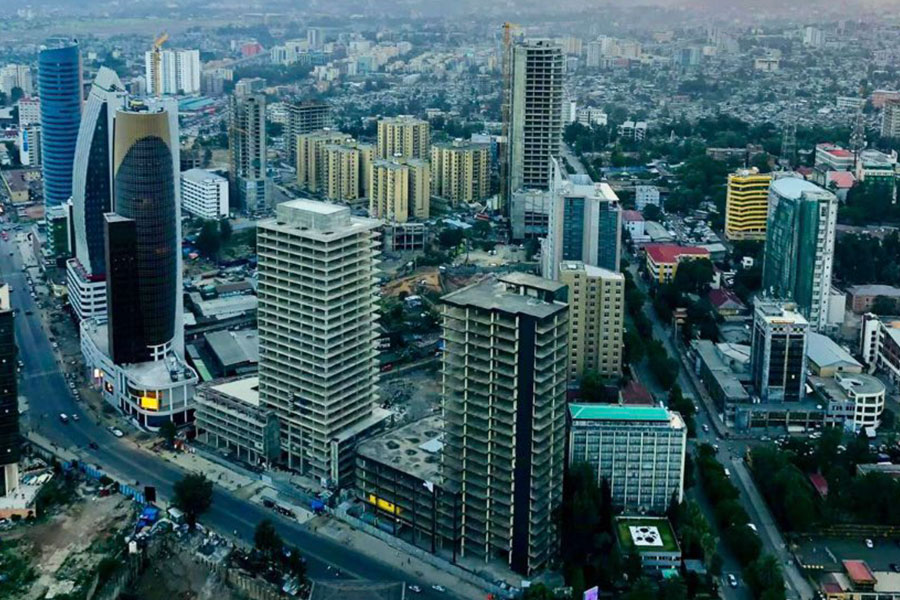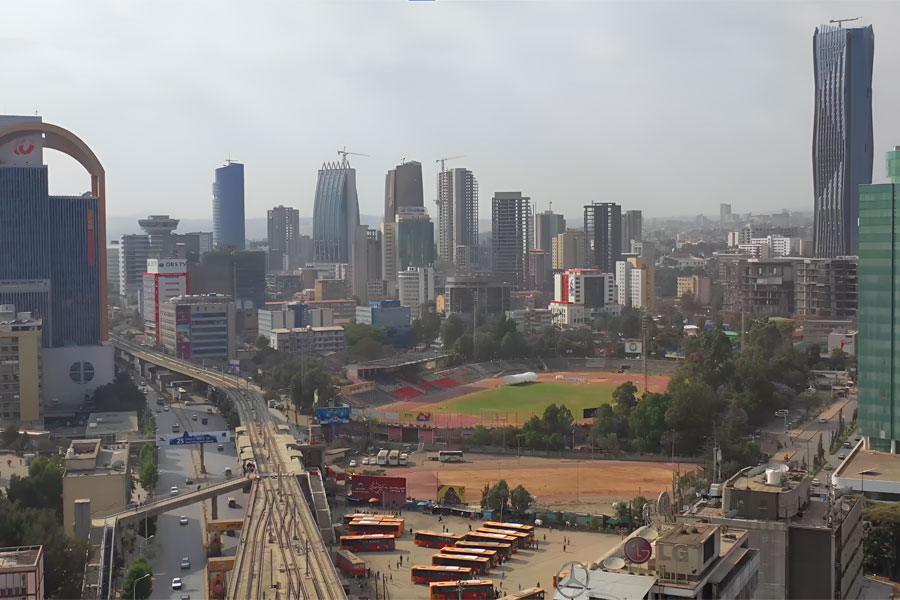
Fortune News | Jun 08,2019
Experts at the Ministry of Agriculture turn their heads to the underdeveloped fish industry, preparing a regulatory framework addressing production quality and market chain.
Officials contend that fish production and quality is plagued by overfishing, poor post-harvest handling, security concerns, and substandard market chains.
According to Tsigereda Fikadu, head of livestock, fishery development desk at the Ministry, traditional fishing methods and untrained fishermen have been the impending problems while the meagre priority given to the industry made it contribute little to the country's economy.
"It couldn't even meet the local demand," she said.
Production of fish stands at 101,4000tn, over half below the demand estimated at 215,0000tn.
With 17,000 fishermen that use traditional fishing gear such as nets and hooks, very few species are caught and even fewer species and lower quality are brought to the market.
According to Tsigereda, expanding the fish portfolio by introducing different methods of fish farming has been deemed essential. The regulation determines species that may be caught, fixing quotas and areas of fishing while setting minimum quality standards for fishing gear, licenses and storage equipment.
With less than 10 processing companies and one feed company, expanding the fish processing and feed manufacturing facilities through investments is stipulated.
The distribution of fish species and overall diversity has been bumpy. Estimates have shown that over 200 freshwater fish species are in over 20 lakes and 12 river basins. Although there are 194 natives, 40 endemics, and six exotic species, only six varieties are presented for public consumption.
"The disproportion is alarming," she said.
Ethiopia has the lowest per capita consumption of fish, standing at less than 0.5kg but plans to improve by freezing the export sector until it meets the domestic demand. To promote research and development activities by expansion of research institutions through investments has been slated in the reform.
There are less than 20 exporters in the country with Sudan and Somalia being the destinations. Six types of dried, frozen and salted fish have been exported to the international markets in the past three years.
The Ethiopian Agricultural Authority is mandated to issue quality assurance for exporters of fish commodities. The Authority licensed only six active exporters who reside in Humera and Metema, where three exporters are left under the authority's oversight.
"We lost contact with the exports in Humera town," Seifu Hailu (PhD), import-export inspection certificate director at the Authority.
In the ended budget year, Ethiopia managed to export 28,659 dollars worth of fish to the Sudan markets, showing a 96pc dip from three years ago. Seifu indicated that even though there is a huge demand in countries like Asia, the underrated production and quality have hampered the country from reaching out.
"Export at this stage is not going to get us anywhere," he said, indicating that rehabilitating local production by inviting investors into fish production is a priority.
Exporters on the one hand, are struggling due to the high levied taxes and debilitating logistics and transportation.
Established with 500,000 Br capital, Birhanu Mebratu Export has been exporting Ambasa and Koroso types to mostly Sudan markets for over 16 years. Employing close to 25 people, the Company sources fish mainly from Amhara, Gambella, Sidama, and Afar regional states.
Nearly 300tn of fish were exported last year. But the Company managed to export 50tns this year.
The Manager, Birhanu Mebratu observes opportunities declining as the market demand is tumbling. He said the low quality, inflated prices and security concerns have been driving most of the exporters to the curb. The meagre attention to providing a sustainable environment for exporters like him has made the pursuit very difficult.
"We're struggling," he said.
Security issues and transportation costs are a challenge for retailers as well.
Anduamlak Buzuwerk, 32, owner of Fish Retail Shop, has been running the family business for more than two years. He sources his products mainly from Bahirdar and Arbaminch cities every two days depending on the market.
He disclosed that logistics hurdles due to security issues have plummeted the supply for the past few months. Andualem disclosed that trying to extend his sourcing lines to Afar and Gambella regional states was deemed unsuccessful.
"The logistics cost is unbearable," he told Fortune.
However, for new entrants such as Khalid Mohammed fishing sector is more hopeful than ever. He resides around the Summit area and began making a living by selling fried fish a month ago. His small vending machine serves up to 15 customers a day.
The 24-year-old used to work for a coffee exporting company, before turning to this business after calibrating on the future prospects. He contends that the local fish supply is fraught with substandard materials, where most vendors have poor handling practices which makes it less appealing to the masses.
"People really do have the appetite," he assured. "But fear the questionable cooking style."
Khalid sources about 50 pieces of fish from Meki and Zeway towns every three days for 60 Br. Depending on its size, he sells it for a price ranging from 70-250 Br per piece.
"I have hope in the business," he said.
More than 75pc of the fish produced in Ethiopia make their way from Tana, Zeway, Langano, Awassa, Abaya, and Chamo lakes.
According to Worku Wondemu, a fish development expert at the Ministry, non-motorized traditional boats and gillnet fishing equipment, on top of illegal fishing and dumping of chemicals and waste material into lakes and rivers.
"There is a huge contamination in the major lakes," he said.
Experts suggest that a small percentage of potential is being exploited noting that the country is not ready for fish export with the cheap standard, base quality, low production and investment.
Tokuma Negisho (PhD), an assistant professor in aquaculture and fishery at Jimma University, indicates that enhancement of human capacity is necessary while suggesting research on hatchery and feed should be the priority.
He recommends the expansion of aquaculture farming which rearing, breeding, and harvesting fish facilities in controlled aquatic environments is a crucial milestone to increase production.
"Cultivating rather than hunting should be practised," he said.
PUBLISHED ON
Sep 02,2023 [ VOL
24 , NO
1218]

Fortune News | Jun 08,2019

Commentaries | Jan 26,2019

Radar | May 13,2023

Agenda | Aug 18,2024

Radar | Oct 12,2024

Fortune News | Jun 29,2024

Agenda | Aug 27,2022

Fortune News | Mar 30,2019

Advertorials | Jul 11,2019

Agenda | Nov 27,2022

Dec 22 , 2024 . By TIZITA SHEWAFERAW
Charged with transforming colossal state-owned enterprises into modern and competitiv...

Aug 18 , 2024 . By AKSAH ITALO
Although predictable Yonas Zerihun's job in the ride-hailing service is not immune to...

Jul 28 , 2024 . By TIZITA SHEWAFERAW
Unhabitual, perhaps too many, Samuel Gebreyohannes, 38, used to occasionally enjoy a couple of beers at breakfast. However, he recently swit...

Jul 13 , 2024 . By AKSAH ITALO
Investors who rely on tractors, trucks, and field vehicles for commuting, transporting commodities, and f...

Jul 5 , 2025
Six years ago, Ethiopia was the darling of international liberal commentators. A year...

Jun 28 , 2025
Meseret Damtie, the assertive auditor general, has never been shy about naming names...

Jun 21 , 2025
A well-worn adage says, “Budget is not destiny, but it is direction.” Examining t...

Jun 14 , 2025
Yet again, the Horn of Africa is bracing for trouble. A region already frayed by wars...